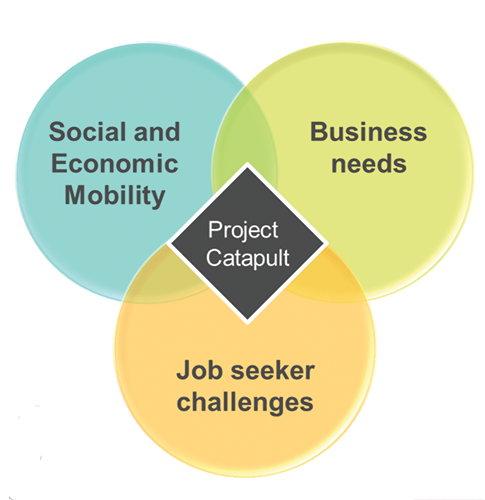
Project Catapult
Project Catapult was launched in 2018 as a response to what was then an unprecedented tight labor market, anticipated attrition due to baby boomer retirements, and growth of high demand and skilled jobs, and a never-before-seen tension between the demand to fill jobs and the lack of supply ready to fill those jobs.
The needed response? A more robust workforce development solution that can launch our untapped talent into new opportunities at a much faster, more direct and sustained rate while also supporting and leveraging the long term success of workers and their employers via advancement, retention, and strong employment practices.
In early 2019, the Boston Foundation, in partnership with SkillWorks and JVS Boston, published The Catapult Papers, a series of four papers on the practices that "next-gen workforce development organizations" are using to connect employers and jobseekers. Catapult followed up the initial publication with Catapult Forward, which captured how a dozen of greater Boston's most-innovative workforce organizations are using 14 best practices to work with employers and workers to find, train and help ensure that workers are being retained in rewarding careers.
The COVID pandemic changed the dynamics of the labor market, at least in the short term, but it also demonstrated that in a post-COVID world the problems Catapult was designed to address had only become more urgent. The goal of Catapult is to invest in the exponential growth of Greater Boston’s most effective, market-driven training and education organizations in partnership with the region’s most savvy businesses in order to leverage the region’s potential for sustaining talent via the workforce system.
Learn more, read our publications and watch the forums by clicking on the links below.
Pillars
Our new model will focus on the success of the jobseeker and employer equally, built upon six pillars:
- Invest in What Works: Greater co-investment for greater returns.
- Emphasize the Role of Business: Create space and value for business engagement and ownership of outcomes for their workers.
- Incentivize and Value Strategic Coalition-Building: Build systems that financially incentivize collaboration and ownership equally among workforce providers and employers and support the true cost of getting jobseekers through training and into good jobs.
- Reward Risk: Place a premium on innovation and taking chances.
- Continuous Improvement: Iterate relentlessly for ongoing enhancement and increasing capacity to deliver core services to jobseekers and employers as the primary customers.
- Appropriately Finance Capacity: Invest in staffing and other organizational capacity building across business services, HR, technology and other needs to achieve more scale and greater impact.
Catapult will create a new way of doing business that is at the convergence of social/economic mobility, business needs and job seeker opportunities.

Catapult Revisited: What Is Still Relevant for Next Generation Workforce Development Organizations in the COVID Recession?
Project Catapult launched in a robust pre-pandemic economy and tight labor market, but one that was plagued by inequity of access and opportunity. As we emerge from the COVID-19 pandemic, how should next-gen workforce development programs and employers change their practices for the future, and how can the principles behind Catapult be applied to this new time?
Released June 28, 2021
Catapult Forward
Catapult Forward: Accelerating a Next-Generation Workforce Ecosystem in Greater Boston, highlights fourteen leading practices that “next-gen” workforce development organizations identified in the report and employers are using to connect to today’s pool of workers, and provides both examples of these practices in action and places where the system must improve to be able to close skills gaps. The Boston Foundation’s Project Catapult and SkillWorks collaborated with Monitor Institute by Deloitte, Deloitte LLP, to create the report.

Catapult Forward: Accelerating a Next-Generation Workforce Ecosystem in Greater Boston
As the Greater Boston regional economy continues to grow, we’re seeing a rapidly expanding gap between the demand for qualified talent and the lack of workers ready to fill in-demand roles. In this latest report, the Boston Foundation’s Project Catapult and SkillWorks collaborated with Monitor Institute by Deloitte to surface and share ways that “next-gen” workforce organizations can work to improve outcomes for workers and employers alike. We will share and discuss the report’s findings and explore how together we can change Greater Boston’s workforce system for the better.
Wednesday, December 18, 2019, 8:30 a.m. - 10:30 a.m.
Watch the video of the event
The Catapult Papers
The Catapult Papers are a series of essays on the future of workforce development and the kinds of workforce organizations that need to be created to expand opportunity for lower-income individuals and create competitive advantages for businesses in need of workers. These "Next Gen Workforce Organizations" will not only require different structures, they will require accompanying investment by philanthropy and government that can make Next Gen workforce development a reality.
Based on the innovative and field-proven practices of JVS Boston's own transition experience and produced as a partnership between JVS Boston, SkillWorks and the Boston Foundation, these four papers tackle the key features organizations will need to embrace to succeed in the changing economy.
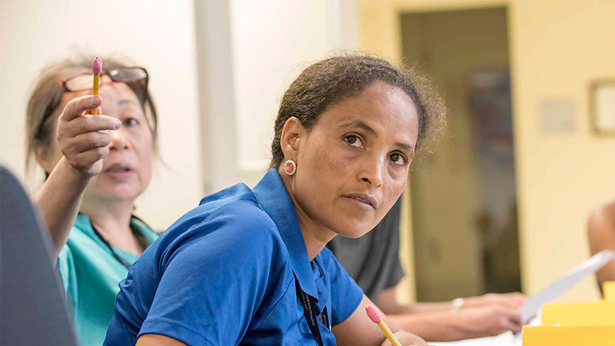
Paper 1: Next Generation Workforce Development Organizations for Our Time: How JVS Is Re-Tooling for a New Economy
In the first paper, JVS Boston President and CEO Jerry Rubin calls for and describes a new, or “Next Generation,” model for workforce organizations. The essay is based on the innovative and field-proven practices of JVS Boston’s transition to a “Next Gen” workforce organization.
Released January 17, 2019
Read the paper online
Paper 2: Scaling Up: Lessons from the Front Lines
In paper 2 of the four-part series, we look at the importance of scale for Next Gen workforce organizations, the challenges of scaling, and issues that the Next Gen workforce organizations and the broader field need to consider as they scale up their efforts.
Released January 31, 2019
Read the paper online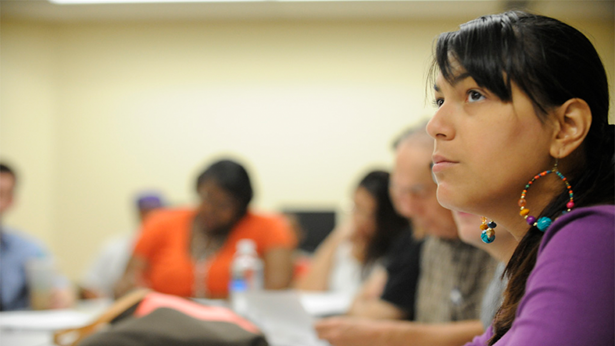
Paper 3: Not Just Any Job: How Next Generation Workforce Organizations Can Help Improve Job Quality for Workers and Competitiveness for Employers
In this third essay, we look at the issue of job quality, and how the current tight labor market can provide an opportunity for workforce development organizations to better align the interests of employers and the needs of workers.
Released February 14, 2019
Read the paper online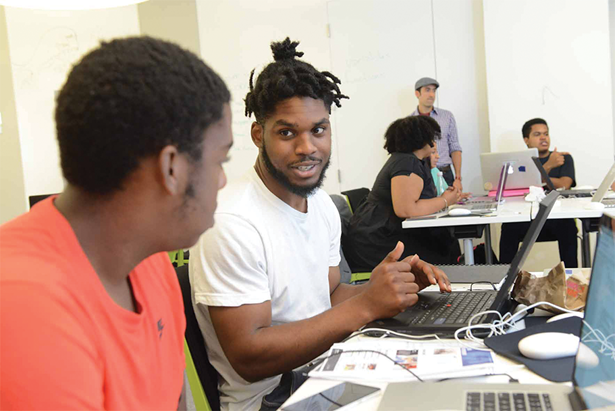
Paper 4: Tapping the Untapped Workforce: How Next Generation Workforce Development Organizations Can Help Employers Recruit and Retain the Talent They Need
In the final paper of the series, Jerry Rubin and Rouguiatou Diallo, the Chief of Staff of Resilient Coders, lay out five key strategies for Next Gen workforce development organizations seeking to attract immigrants, young adults, and others who are being missed in the current paradigm.
Released February 28, 2019
Read the paper online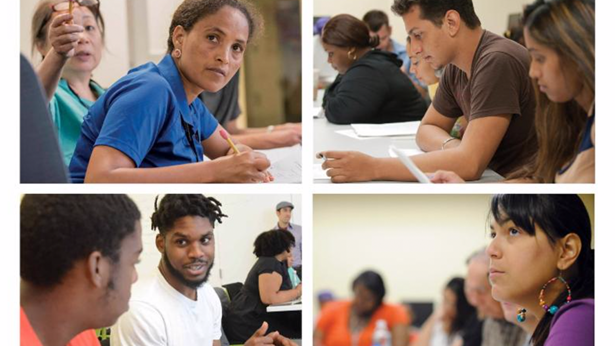
Project Catapult: Investing in Next-Generation Workforce Solutions
The Boston Foundation, SkillWorks, JVS, Resilient Coders and JP Morgan hosted a forum to highlight the release of the new Catapult Papers series of essays on the next generation of workforce development, and to discuss new initiatives to accelerate change in policy around workforce training.
Thursday, March 7, 2019, 8:30 a.m. - 10:30 a.m.
Watch the video of the forumDiscussion
The Catapult Papers are designed to spur discussion. With that in mind, the authors have invited key workforce, business and academic leaders and members of the public to share their reactions to each paper.
Read comments from:

